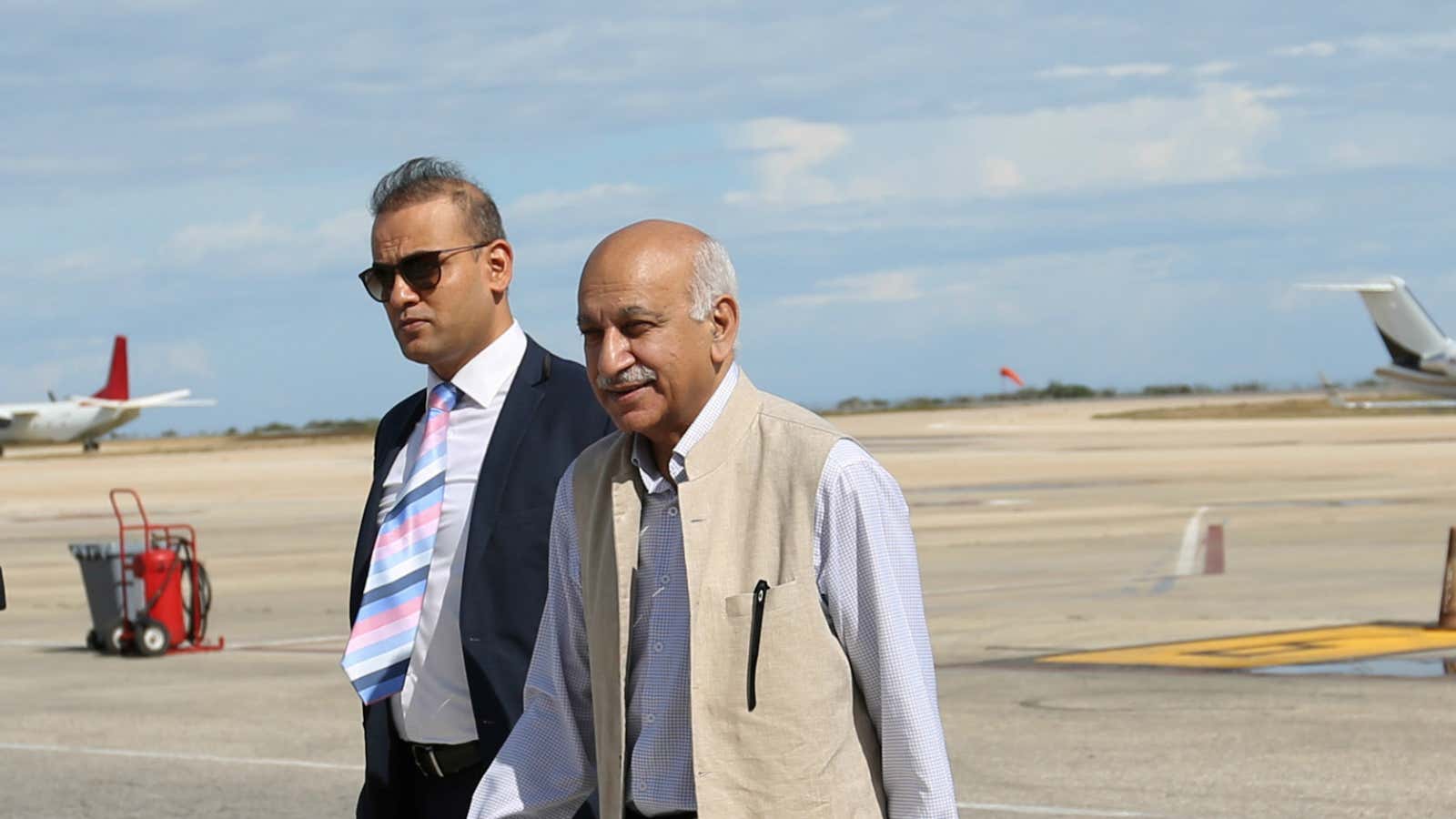With each passing day, India’s #MeToo movement is leaving less wiggle room for the biggest name yet to be called out for alleged sexual harassment.
Since MJ Akbar, India’s minister of state for external affairs and a former journalist, filed a defamation case against Priya Ramani, the first of many women to speak out about his alleged sexual harassment, over a dozen more women have come forward to support her and tell their own stories.
The opposition Congress party has said that by refusing to make Akbar resign, the government “is actively protecting & promoting the sexual perverts.” Prime minister Narendra Modi’s Bharatiya Janata Party (BJP), on its part, has maintained a stoic silence.
Akbar was a veteran newspaper editor before becoming a BJP parliamentarian in 2015. Over the past weeks, as a #MeToo wave has swept India, multiple women have recounted detailed stories of alleged harassment at his hands during his time as a journalist, especially during interviews conducted in hotel rooms.
Yesterday (Oct. 16), 20 women who worked with Akbar around the time he launched the Asian Age newspaper in 1994 wrote a petition to condemn his alleged sexual misconduct and his choice to take legal action against Ramani. “What Mr. Akbar has demonstrated through his legal actions is his refusal to introspect, acknowledge or atone for his actions that have caused immense pain and indeed harm to many many women over the years,” the petition reads. It also requests that the court hearing the defamation case hear their testimonies, which include some firsthand accounts of sexual harassment by Akbar and some witness accounts.
Ramani first spoke about Akbar’s conduct on Oct. 08. On Twitter, she reposted an article she had written for Vogue India last October in which she detailed an inappropriate interview an editor had conducted with her in his hotel room when she was 23 and he was 43.
In her Oct. 08 tweet, she said that while she had not named Akbar then, she was confirming now it was him. “Lots of women have worse stories about this predator—maybe they’ll share,” she wrote.
And share they did.
An outpouring of stories
By Oct. 10, six women had come on the record for a report by The Indian Express newspaper on Akbar’s conduct. Among them was Suparna Sharma, currently the resident editor of Asian Age, Delhi, who spoke of a time she reported to Akbar in the mid-1990s. One day, Akbar allegedly stood behind her in the office and plucked her bra strap. “I screamed at him,” Sharma told The Indian Express.
Accounts of Akbar’s misconduct continued to snowball.
Journalist Ghazala Wahab wrote an article for The Wire on Oct. 12, detailing an experience in which Akbar allegedly molested her and sexually harassed her in the Asian Age office in 1997.
Tushita Patel wrote a piece in Scroll yesterday (Oct. 16) that detailed his behaviour, including multiple attempts to forcibly kiss her in the early 1990s. One part of her account reads:
When you couldn’t find me, you desperately sent out a search party. At some point, someone found me. Akbar saab is looking for you. Heavy with dread, I waited till it was almost time for your flight and met you at the most public of areas in the office—near the reception. You said chirpily, “Where did you disappear? I’ve been looking for you—we have to discuss your page.” And with that you ushered me into the empty conference room, grabbed me again and kissed me.
The day before he filed the defamation case against Ramani on Oct. 15, Akbar issued a statement in which he stated that the allegations made against him were “false and fabricated, spiced up by innuendo and malice.” The statement only refers specifically to Wahab’s and Ramani’s stories, denying both of them completely.
Akbar’s statement repeatedly refers to a part of Ramani’s Oct. 08 tweet, in which she said that in her initial article, she didn’t choose to name him “because he didn’t ‘do’ anything.” Akbar’s statement seizes upon this phrase, strips it of its loaded quotation marks, and interprets it as an admission, saying, “If I didn’t do anything, where and what is the story? There is no story.”
In a piece published yesterday (Oct. 16) by The Quint, journalist Swati Gautam writes of an incident when Akbar called her to his room at the Taj hotel and opened the door in his bathrobe, asking her to make him a drink. She left the room, she writes, “thankful that he didn’t ‘do’ anything,” as well.
But as she concludes the piece, Gautam writes, “There is law and there is universal law. Preying on others, disrespecting the dignity of those who are vulnerable, being brazen in the face of terribly inhuman accusations and behavior etc may not technically breach the former, but it does, and certainly does violate the latter. The conscience sees it all.”
